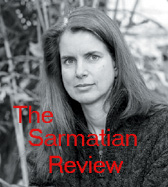| This Issue | Back Issues | Editorial Board | Contact Information |

Our Take
Krasinski's Undivine Comedy savaged at the National Theater
On June 28, 2002, representatives of Sarmatian Review went to the National Theater in Warsaw (the Wierzbowa stage) to see the production of Undivine Comedy by Zygmunt Krasinski. The play was written in 1833, and it reflects the tragedy of a young aristocrat (Krasinski) torn between the duty to his accommodationist father and the conviction that the injustices of the system require a violent response. In the play, this personal drama assumes universal proportions. The leader of the revolutionaries named Pankracy (Dostoevsky seems to have modeled Stavrogin and Peter Verkhovensky in The Devils on this little known Polish character) offers a defense of the revolution in a grand monologue. The leader of the defenders of the old system, Count Henry, cannot muster a matching rebuttal, but he is profoundly convinced that the revolutionaries are wrong. Other defenders of the old system are shown as cowards, cheats, and spiritual dwarfs. On the other hand, the revolutionary mob is shown as fully corrupt and dominated by hatred, greed, addiction to orgiastic sex and class envy. At the end of the play, Pankracy wins and ‘the Ramparts of the Holy Trinity' (against which the revolutionaries fought and won) surrender. But instead of the moment of triumph, Pankracy is overwhelmed by weakness exacerbated by a light that suddenly blinds him. He dies exclaiming "Galileae, vicisti!" (a reference to Jesus's victory on the cross).
To our great amazement, this powerful plot was grotesquely distorted by producer Jerzy Grzegorzewski. Krasinski's message was loud and clear: the old order is corrupt and it has ever been so, but it provides a place for values essential to human dignity. The revolutionaries are corrupt to the point of being incapable of embodying any values. Their leader is a cynical manipulator of crowds whom he despises, and he is motivated by gigantic resentment against those presently in power. Above this dark reality loom the teachings of Christ whose death on the cross was the ultimate guarantee that values have meaning and that not all in the universe is a product of greed, resentment and hatred. In a clear distortion of Krasinski's text, Mr. Grzegorzewski added words to it and eliminated others. He made the nihilistic element of the play into its only element. He made Undivine Comedy into a display of vulgar sex couched in the self-preservation instinct. The element of nobility in the old system was entirely eliminated: Wife's and Priest's admonitions were made to sound ridiculous, and passages in Count Henry's monologue referring to the aristocracy's feudal obligations were cut out. Pankracy's monologue was also rewritten, and words of contempt directed at Polish language and national solidarity were added to it. This falsification of a classical text is like a business crook's falsification of records, and should lead to similar consequences. On balance, it appears that the producer's mind was too petty to accommodate Krasinski's grand themes. Grzegorzewski's mentality was unable to comprehend the subject matter of Krasinski's drama. The producer was intellectually unsuited to direct the play.
One wonders why persons such as Mr. Grzegorzewski are tolerated as artistic directors of the National Theater. Surely this post should be given to a person who is able to present literary traditions in a light that encourages the viewer to become familiar with them. We asked knowledgeable people, who appoints artistic directors and producers at the National Theater? Is it director-in-chief Krzysztof Toronczyk? And who appoints the director-in-chief? The Communist-induced secrecy and apathy about details of appointments is such that no one could give us an authoritative answer. But we found some of the sponsors of the National Theater. These are: Telewizja Polska SA, Polskie Radio SA, Bank Pekao SA, Anpol-Reklaman na City Lightach.
Back to the September 2002 issue
The Sarmatian Review
sarmatia@rice.edu
Last updated 9/25/02